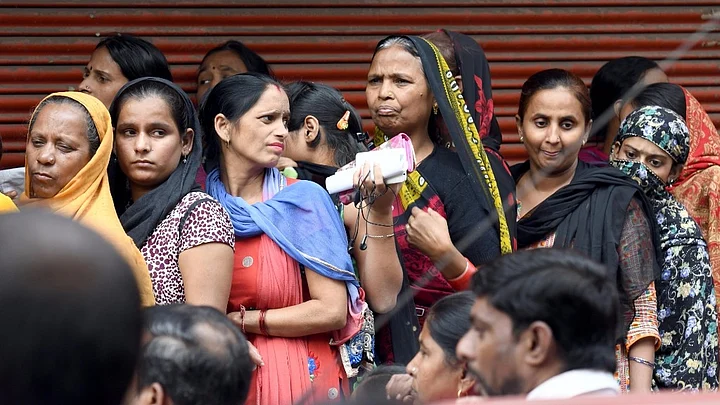Though numerous opinion polls show that more than 80 percent of people surveyed support currency demonetisation, stories of distressingly long queues, dysfunctional ATMs, multiple withdrawals, etc abound. In all of this chaos - does currency demonetisation impact women differently? And if so, how? My answer is: Yes, a resounding yes, as shown through the 5Cs below.
Financial Dependence
1. Consent: Several women (across socio-economic classes) often require consent of male relatives when visiting banks; while documents carrying name/signatures of a father/husband are required if they open an account. Also, mobile wallets (e.g. Paytm) require mobile phones, to which women may not have access. The currency demonetisation therefore places women at a significant disadvantage as a result of the need for male consent.
2. Choice: Informal workers receiving their salary in cash are severely disadvantaged, as they often lack government IDs. This disadvantage is amplified for women, particularly sex workers, and they become susceptible to abuse from their employers. These women also have an acute shortage of time, owing to the triple burden of household, childcare and wage labour, making it difficult to stand in queues to exchange currency on a daily basis. Consequently, they are likely to lose agency over their earnings if the exchange is handled by male relatives/employers. Overall, demonetisation reduces their choice over their time and earnings, vis-à-vis men.
Challenges in Cash Exchange
3. Challenge due to safety concerns: Far fewer women can be seen queuing at ATMs, owing to safety concerns. Even if ATMs function for longer hours, women may not risk going out alone late in the evening, owing to the ever-imminent threat of violence, be it in large metros, or remote villages. This effectively reduces the time they have to access ATMs, thus making cash exchange far more challenging.
4. Cache of savings: The perception that savings from household expenses would be lost, and would need to be disclosed to the husband/family, severely impacts homemakers. Further, where women are victims of physical, mental or emotional domestic abuse, cash becomes their personal safety net, having higher utility than its monetary value. These women may be hesitant to disclose the amount fearing abuse, and may end up losing their savings.
5. Constrained by physical barriers: The near impossibility of physically accessing banks, intensified by the perception that there has been a sudden loss of lifelong savings, can have a debilitating psychological impact on the elderly and disabled. Banking and digital payment systems can be difficult to comprehend owing to technological barriers. This impact is compounded in womens’ cases, as they may be accustomed to their male relatives handling “money matters”.
How Can This Be Remedied?
Central and state governments, in partnership with NGOs, banks and mobile wallet operators should ensure a smooth exchange of currency for women, and work towards improving women’s access to non-cash payment methods in the long run. Some steps could be as follows:
1. Camps encouraging women to open banks accounts: Urban local bodies/ village panchayats could partner with banks to set up camps for Aadhar card registration and to open accounts under the Jan Dhan Yojana till 30 December, with specific targets to enlist women.
2. Currency exchange services for women:
a) Mandating banks and post offices set-up separate queues for women;
b) Partnering with resident welfare associations (RWA), community groups and village panchayats to set up women-only, physically accessible currency-exchange centres:
- These could be set-up on weekends, allowing exchange upto weekly withdrawal limit in one day;
- Volunteers could help elderly and disabled (men and women) with exchange at these centres
- Women lacking government IDs could be allowed to exchange their cash by providing alternate documents, e.g. photocopy of Aadhar card application at these centres only;
c) Community-workers, such as Anganwadi workers, could hold local events, as well as conduct selected door-to-door visits, to clarify the rules of currency exchange and assure women that their savings are safe.
Promoting Use of Mobile Wallets
Studies show that mobile wallets (e.g. M-Pesa) have helped African women secure savings from theft and misuse by male relatives, and allowed their use as collateral to raise loans and start small businesses. Mobile wallet operators (MWOs) could consider partnerships with NGOs, and micro-lenders to increase use amongst women, eg microloans could be given only through wallets.
MWOs would need to ensure access on both the buyer and seller side, and facilitate SMS-based transactions on feature phones. The government could also support this endeavour by mandating that sellers provide at least one other option to cash for transactions.
Ensuring Easy Access
4. Ease access to banking for women: Systemic changes are needed to ease women’s access to banks. Specific guidelines may be issued by the centre to sensitise bankers. Further, banks could use this opportunity to incentivise women, for instance, offering nominally higher interest rates for accounts held in womens’ names, with the centre supporting them through policy action.
5. Change attitudes amongst women: State governments could partner with NGOs to educate women on why and how they can go cashless, with the long-term aim of changing social mindsets and attachment to cash.
In conclusion, it is incumbent upon the government to take note of women’s differential responsibilities and constraints, and address them through simple, practical steps to ensure they are not left out in this period of transition.
(The writer is senior consultant with PricewaterhouseCoopers. She can be reached @mitalinikore. This is a personal blog and the views expressed above are the author’s own. The Quint neither endorses nor is responsible for the same.)
Also Read: Dear PM, Your ‘Kadak Chai’ More Bitter for the Poor than the Rich
